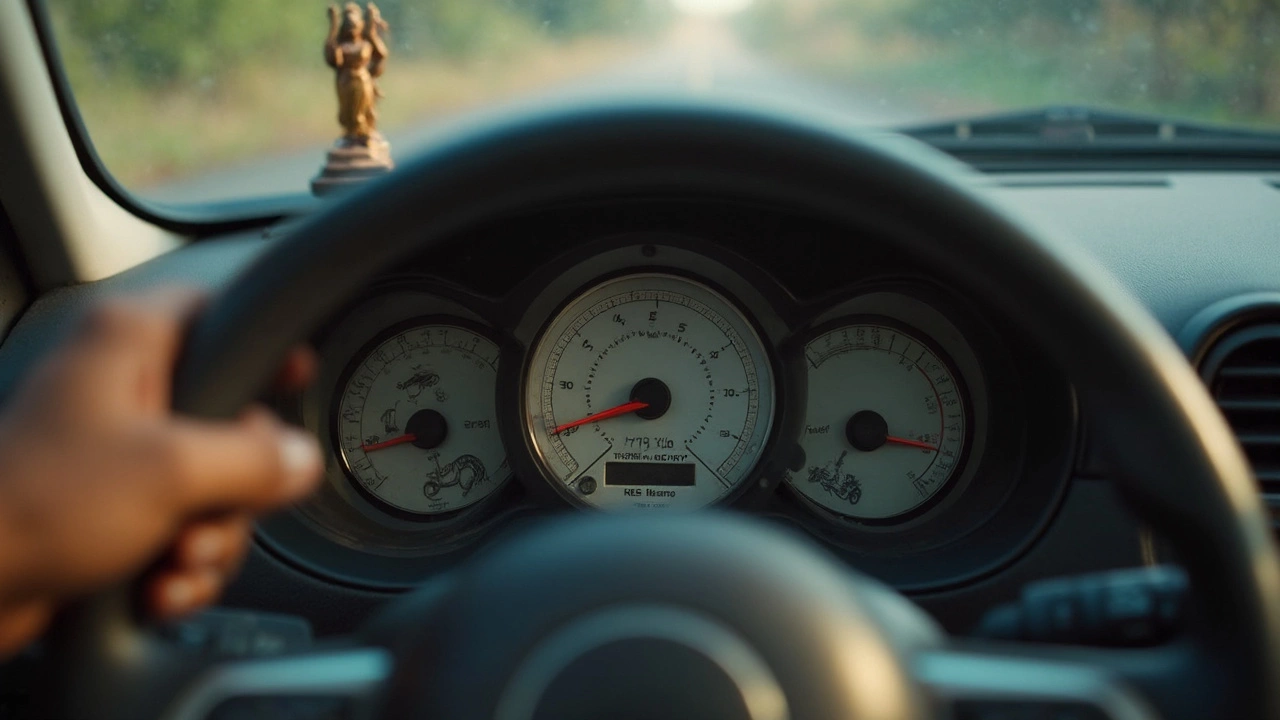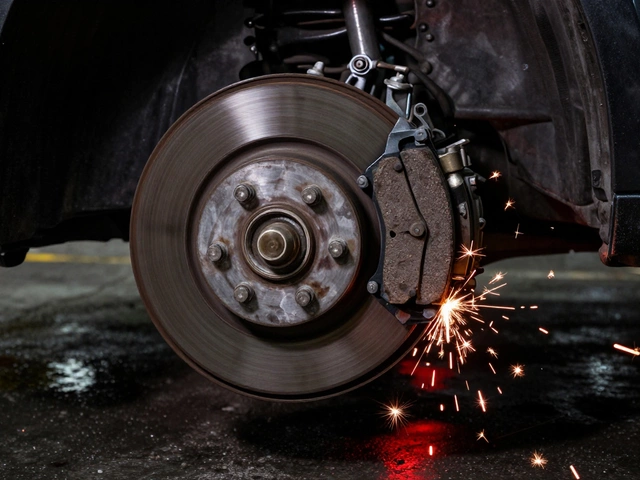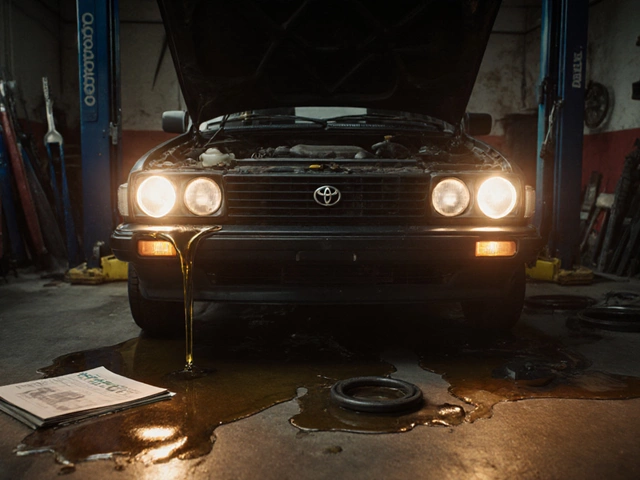Ever found yourself stuck on the side of the road because your car's acting all wonky? You're not alone. A failing fuel pump can make your life miserable if you don't catch it early. Imagine you're cruising and suddenly your engine starts sputtering, like it's had one too many late nights. That's a big red flag your fuel pump might be on the fritz.
If starting your car feels like rolling the dice, it might be more than just a random glitch. A stubborn ignition is a classic sign of a failing fuel pump. You turn the key expecting the usual roar, but instead, you're met with awkward silence or a half-hearted attempt to start.
And don't forget about that sluggish feeling when you're trying to accelerate. If your car seems to ignore your foot on the gas, it’s not being rebellious—it might just be starving for fuel thanks to a dodgy pump. No one likes a fuel-efficient vehicle that suddenly turns into a gas guzzler, all because the fuel pump’s efficiency has taken a nosedive.
Listen closely for unusual whirring sounds from the fuel tank. It's like a subtle whisper telling you the pump is working overtime or struggling. Picking up these signs early can save you heaps of trouble. Keep an ear out and a keen awareness, and you’ll be on top of any fuel pump shenanigans before they get wild.
- Engine Sputtering and Stalling
- Difficulty Starting the Car
- Loss of Power During Acceleration
- Decreased Fuel Efficiency
- Unusual Noises from the Fuel Tank
Engine Sputtering and Stalling
Imagine you’re driving down the road, feeling the wind in your hair, when your engine starts making these sputtering noises like it's had one too many coffees. Not cool. This is often one of the first signs of a fuel pump heading towards failure.
You see, your fuel pump is supposed to give your engine a steady supply of fuel. When it can’t do its job properly, your engine gets fed a patchy fuel supply. That’s when the sputtering kicks in, usually when you're cruising at high speeds or accelerating.
If the engine sputters for a bit and then returns to normal, you might brush it off. But don’t ignore it, because ignoring sputtering can lead to more frequent stalling. That’s where your engine just cuts out completely, sometimes leaving you stuck in the most inconvenient of places.
Wondering why this happens? Over time, dirt and debris can clog up the fuel pump or the filter, making it tough for fuel to flow smoothly to your engine. It's like trying to sip a thick smoothie through a straw—you’re working too hard for too little result.
Fuel pumps are designed to last, but they’re not immune to wear and tear. Especially if you frequently run your car on low fuel, since that can cause overheating and reduce the life of the pump. Just something to keep in mind next time you're ready to push those last kilometers without refueling.
If you're experiencing these symptoms, consider checking for any leaks in the system or if the fuel filter needs a change. Sometimes the problem isn't the pump itself, but something around it causing the hiccup. Staying on top of your car's maintenance schedule can head off these problems at the pass.
To sum it up, if your ride’s acting like it needs a cough drop, don’t wait around for it to get worse. Addressing these early signals of engine sputtering and stalling can keep you from facing more significant vehicle troubles later on.
Difficulty Starting the Car
Ever tried starting your car and felt like it was in its rebellious teen phase, refusing to cooperate? That hesitation or downright refusal to start is often a classic symptom of a failing fuel pump. When the fuel pump starts to go bad, it struggles to send the right amount of fuel to the engine. Without enough fuel, your engine won't start smoothly or sometimes at all.
It’s not just a random one-off thing, either. If you're consistently needing to crank the engine multiple times before it roars to life, that's a strong clue. The trouble starting might start gradually, so don’t brush it off as a fluke if it happens once or twice.
Modern fuel systems are intricate. If the pump is underperforming, it might still provide enough fuel for the car to start eventually but not without some hesitation. It's like trying to suck a thick milkshake through a narrow straw—not the most efficient way to get things flowing.
Also, pay attention to weather patterns. Cold mornings might make starting even harder if your pump’s on its way out. As tempting as it is to procrastinate on checking things out, don’t wait until you’re stuck somewhere inconvenient. Replacing a fuel pump isn't cheap, but it’s way less painful than dealing with a full-on breakdown.

Loss of Power During Acceleration
Ever had that gut-wrenching moment when you push down on the gas pedal and your car kinda just… ignores you? If your ride suddenly feels sluggish and unresponsive, your fuel pump might be throwing a fit. This loss of power is often because the fuel pump isn’t delivering enough fuel to the engine when it needs it most.
Picture this: you’re merging onto the highway, you need that power boost to get up to speed, and nothing happens. It’s frustrating, right? What's happening here is that a weak fuel pump can't maintain the pressure needed during acceleration. It can’t keep up with the engine’s demand for more fuel, causing a major slump in performance.
Here’s a little tip: keep track of how consistently this happens. If it’s catching you off guard every other day, it's a sign you shouldn’t ignore. Sometimes, it helps to keep a log of when and how often the acceleration drops. This can be massively helpful when you talk to your mechanic.
Quick heads up: If you notice a sudden decrease in your car’s power while trying to accelerate on an incline or towing something, it might not be the weight that's causing it. The fuel pump could be begging for help.
Now, before you rush to conclusions, it’s worth ruling out other potential issues, like a clogged fuel filter or bunged-up injectors, which can also mess with acceleration.
| Potential Cause | Impact |
|---|---|
| Clogged Fuel Filter | Restricts fuel flow, simulating pump issues |
| Blocked Injectors | Reduces fuel efficiency, affecting power |
Fixing it could be as simple as a replacement if you catch it early. So, don't overlook those signs, and definitely don't ignore that lackluster acceleration. It’s your car's way of saying it's time for a check-up!
Decreased Fuel Efficiency
Seeing your petrol bill go up because your car’s drinking fuel like it's going out of style? That's a clue something might be off with your fuel pump. Usually, cars maintain a steady fuel consumption rate unless you suddenly decide to play Fast & Furious. So, if you're suddenly hitting the petrol station more often without justifiable road trips, take note.
A worn-out fuel pump might not deliver the right amount of fuel to the engine, forcing it to work harder just to keep things running. This not only strains your engine but also knocks your fuel efficiency out of whack. Picture it like trying to run a marathon with a pinched straw for breathing or something equally frustrating.
Trying to squeeze more life out of a dodgy fuel pump can worsen the situation. Keeping an eye on your car’s average fuel consumption can alert you before things escalate. In most modern cars, you can do this right from your dashboard. Just toggle through the on-board computer to check your latest consumption rate.
Wondering how much this inefficiency could cost you? Check out this simple representation:
| Normal Efficiency | Decreased Efficiency | Extra Annual Cost |
|---|---|---|
| 12 km/l | 8 km/l | $500 |
Notice how a seemingly minor drop in km/l can hit your wallet after a while? That’s why paying attention to these signs is crucial. Addressing issues with your vehicle sooner rather than later can save you from those extra fuel costs—and maybe even from being stuck on the side of the road.

Unusual Noises from the Fuel Tank
If your car starts channeling its inner ghost with eerie sounds coming from the fuel tank, it's not haunted—it's probably a sign your fuel pump needs some attention. Normally, a fuel pump should be quietly doing its job; the most you should hear is a soft humming. But when it begins making loud whining or even screeching noises, something's definitely off.
The noise often happens when the pump's getting old or if there's contamination in the fuel. Sediments accumulate, and while it might not scream danger immediately, that constant grinding noise is the pump's way of saying it's struggling. If you've noticed this sort of sound—especially right after starting your car or when the tank's running low—it's a signal to get things checked out quickly.
Ignoring these noises can lead to more severe car fuel issues, like complete failure, leaving you stuck. If you're noticing sounds like you’re blending marbles in a tin can, a trip to the mechanic is a smart move to avoid being stranded.
To keep your fuel system happy, use quality fuel and stick to a regular service schedule. This way, you can catch potential problems early. No one wants to be surprised by a huge repair bill, right? Regular monitoring and maintenance of your vehicle can make sure that your fuel pump, along with other parts, stays functional for longer.




